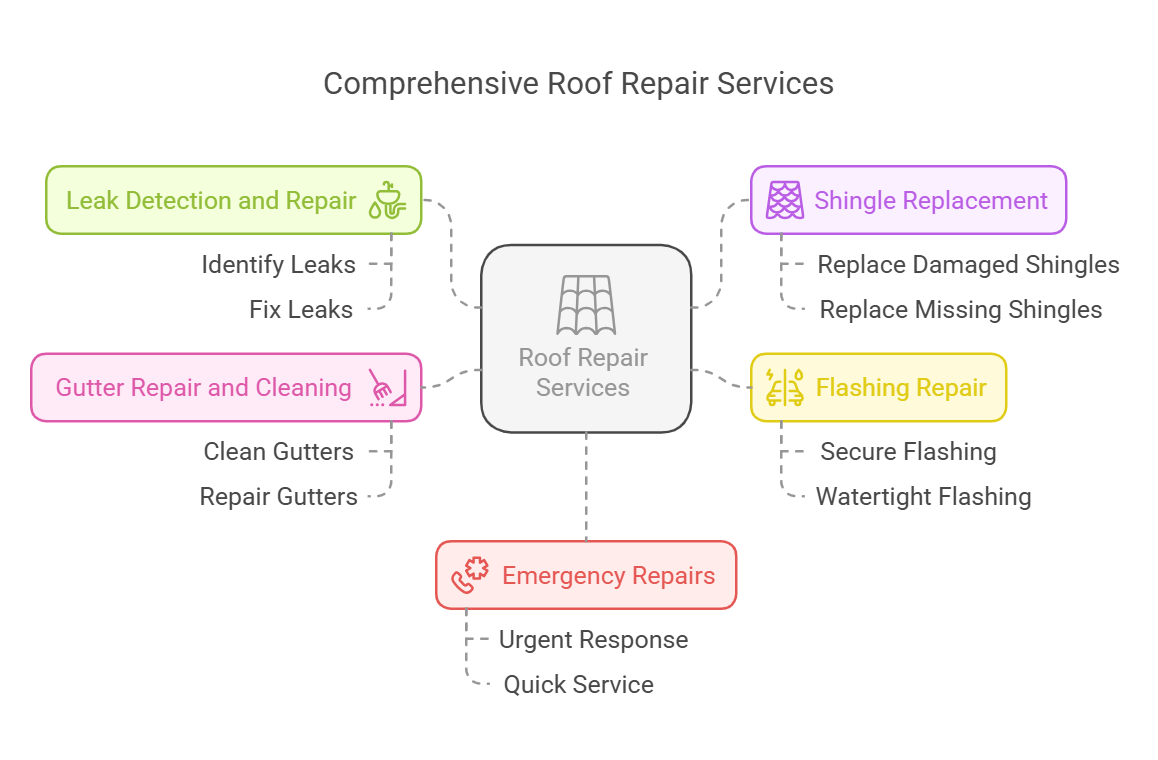Winter roof leaks hit hard. You’re not just dealing with water – you’re fighting snow, freezing rain, and time. In Toronto, that’s a dangerous mix.
Leaks don’t wait for spring. And ignoring them? That’s how small problems become structural damage. Here’s how to spot them, what you can handle on your own, and when to call in Toronto Roofer.
First signs your roof is leaking in winter
Most people don’t see a roof leak start. They notice the damage later. Watch for these signs:
-
Water stains on ceilings or walls – light brown rings are typical
-
Dripping sounds you can’t locate
-
Wet spots in the attic, insulation that feels soggy
-
Smell of mildew near walls or upper floors
-
Paint bubbling or peeling near ceilings
-
Ice dams along the edge of the roof
-
Higher heating bills – insulation might be soaked
It’s easy to miss small symptoms. That’s how damage builds up.
Why roofs leak during Toronto winters
Toronto winters are brutal. Your roof gets no break.
Here’s what often goes wrong:
-
Freeze-thaw cycles crack shingles, flashing, and seals
-
Ice dams block drainage, water backs up under shingles
-
Wind lifts or snaps shingles off
-
Attic moisture freezes, then melts, then drips
-
Old caulking around chimneys or skylights splits
It’s not always one big hole. Sometimes it’s five small ones.
What you can fix yourself (and what you shouldn’t)
Some people try to handle roof leaks solo. Sometimes that’s fine. Sometimes it’s not.
Safe DIY steps (for homeowners who want to try)
If the leak is small, and the roof is not icy or steep, try these:
-
Tarp the area. Weigh it down with sandbags or bricks. Do not nail it down.
-
Apply roofing cement (only from inside the attic or crawlspace).
-
Use a roof rake to clear snow from the edge – while standing on the ground.
-
Check for attic moisture. Move wet insulation aside, place a bucket underneath.
Don’t try this in winter
Skip anything that sounds like a good idea but ends with the word “hospital.”
-
Don’t climb ladders during snow or ice
-
Don’t chip ice dams off with tools
-
Don’t pour salt on the roof
-
Don’t replace shingles in freezing temperatures
Stay alive. Stay on the ground.
Emergency patch options until spring
You don’t always need a full repair right now. You need to stop the roof leak – now.
Here’s how to buy time:
-
Tarp the area securely and fasten with weights
-
Spray foam (low-expansion type) can fill a small gap if applied indoors
-
Use buckets or diverters inside to redirect water
-
Heated cables prevent ice dams but only install when conditions are safe
These aren’t perfect fixes. They’re band-aids. You’re stopping the water, not solving the problem yet.
When to call Toronto Roofer
Don’t wait too long. If you’re reading this and water’s dripping while snow’s falling, it’s time.
Call Toronto Roofer when:
-
There’s an active leak during snow or freezing rain
-
The ceiling is sagging or there’s more than one leak
-
You see mold or smell mildew near the attic
-
The insulation looks soaked or frozen
-
You’re not 100% sure where the leak is coming from
-
You’re unsure what to do next and want expert help
We don’t waste time. We don’t guess.
How Toronto Roofer handles winter roof leaks
We work in winter. Fast. Carefully.
Here’s how we do it:
-
Indoor inspection first – we check attic, insulation, drywall, and leaks
-
Moisture detection tools show us what’s soaked
-
Temporary patches to stop leaks
-
Tarping service if safe and necessary
-
Full report on what repairs are needed come spring
-
Transparent pricing so you know what to expect
No hidden fees. No upselling. No BS.
Tips to prevent future winter leaks
If this winter has been rough, don’t wait for the next one to be worse.
You can stop most winter roof leaks with prep:
-
Improve attic insulation – keep the heat in, moisture out
-
Ventilate the attic – circulation prevents condensation
-
Install heat cables near roof edges (before snowfall)
-
Clean gutters and downspouts in late fall
-
Book a fall inspection with Toronto Roofer next season
Prevention is cheaper than damage control.
FAQs
Can you fix a roof leak in the winter in Toronto?
Yes. Most repairs are temporary until spring, but they can stop active leaks right now.
What is the best temporary fix for a leaking roof?
A heavy-duty tarp with weights (like sandbags) is usually safest and fastest. Use roofing cement only if reachable and dry.
Is it safe to go on the roof in the winter?
No. Icy shingles, high winds, and hidden weak spots make it dangerous. Stay on the ground.
What causes roof leaks during winter in Canada?
Common causes include freeze-thaw cycles, ice dams, wind damage, and poor attic ventilation.
Should I remove ice dams myself or call a roofer?
Call a roofer. Removing ice dams on your own risks injury and roof damage. Use a roof rake from the ground instead.
How much does emergency roof repair cost in Toronto?
It varies. Temporary roof patches can start around $300. Full inspections and repairs may go higher depending on damage.
How fast can Toronto Roofer respond to leaks?
We aim for same-day service during active leaks. Winter response depends on weather, but we move fast.
Summary
Winter roof leaks in Toronto aren’t rare. Most start small and grow fast. If you see stains, drips, or signs of water damage, act now.
You can tarp. You can rake snow. But don’t gamble with safety. If the leak’s bad – or you’re not sure – Toronto Roofer is ready.
Want help now?
Call Toronto Roofer at (647) 847-8826 or book online. We patch first, explain everything, and fix it properly when the weather lets us.





